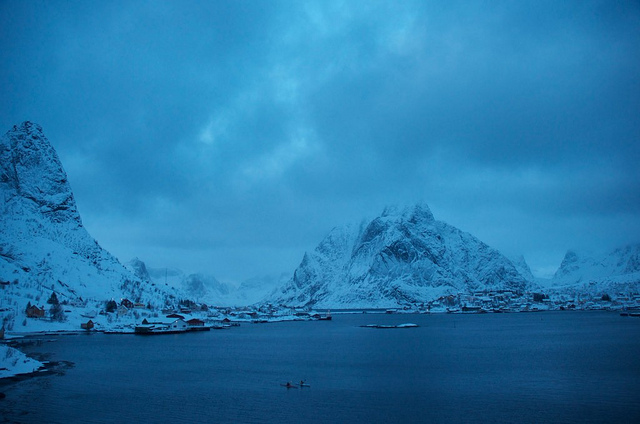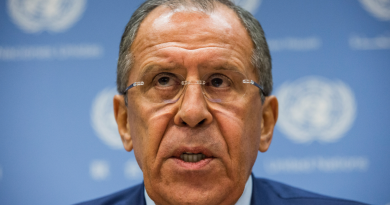Blog: Norway’s election result and the implications for the Lofoten Islands

In my previous post, I noted how there isn’t likely to be a dramatic shift in Norway’s Arctic policy even though the Conservatives will now be at the helm of government.
Regardless of whether Labour or the Conservatives dominate, oil will still be one of Norway’s top priorities in the Arctic. But questions remain as to how exactly development will proceed. This election cycle, one of the most important and contentious issues was whether to carry out an environmental impact assessment (EIA) in the Lofoten and Vesterålen Islands, where the Ministry of Oil and Energy has estimated a 95% probability of finding at least 76 million standard cubic meters of oil equivalents (Misund & Olesun, 2013).
Both Labour and the Conservatives support going ahead with an assessment of the scenic archipelago partly because the country’s oil production is set to fall to a 25-year low. This decrease has spurred the government to permit companies to bid on blocks in the oil rich eastern Barents Sea. The 23rd licensing round of the Norwegian shelf, which started on August 29, follows on the heels of an earlier leasing round this year that granted 24 licenses in the western Barents Sea. Exploration is proceeding quickly, too: on September 6, Austrian company OMV announced that it had discovered a well with between 63 million and 164 million barrels of oil in a license area for which it was granted a drilling permit in July. (It’s also interesting to note that Japan’s Idemitsu Petroleum holds a 20% stake in the license area.) A map of licensing areas in the Barents Sea is available here.
Oil exploration and drilling in the Barents Sea, however, is not as controversial as around the stunningly scenic Lofoten Islands, where fishing and tourism are the primary industries. Knut Saeberg, CFO of North Energy, a Norwegian Arctic energy exploration company, stated, “We need Lofoten but most of all, Lofoten needs the oil industry.”
Not all the locals on this archipelago straddling the Arctic Circle agree. In fact, a majority are opposed to drilling. In March 2012, Geographical magazine published an in-depth article detailing the sentiments of local residents and fishermen. Earlier this year, Reuters quoted Lofoten fisherman Erling Santi as saying, “We’ve already got the winning lottery ticket by living in Norway. We shouldn’t want to be even richer.”
Santi and other fishermen opposed to drilling could have their way if the smaller parties in Parliament continue to oppose an EIA in the archipelago. The potential new four-party coalition disagrees over Lofoten drilling. The Conservatives and Progress Party are in favor, while the Liberals and Christian Democrats are against it. In June, Solberg observed to VG that a blue-blue (Conservative-Progress) and a blue-green (Conservative-Liberal) alliance would differ on the issue. She said, “It is the voters who will determine the relative strength of the parties, and thus government policy, but oil drilling off Lofoten and Vesterålen is clearly an area where there will be a clear difference between the two options.”
As the Progress Party did not win as many seats as hoped, a Conservative-Progress coalition will now not be enough to secure a majority in government, let alone approve a Lofoten EIA. Given that a four-party coalition is now likely, some analysts believe that the Conservatives may have to abandon plans to carry out an EIA for oil in the Lofoten Islands in order to curry favor with their two junior partners, the Christian Democrats and the Liberals. Trine Skei Grande, leader of the Liberal party, declared to VG in June, “Stopping oil drilling in Lofoten and Vesterålen will be top of my list when I negotiate.” Grande is pushing for inclusion of the Lofoten Islands in the UNESCO World Heritage list and has compared the northern archipelago, which has the largest deep-water reef in the world, to Australia’s Great Barrier Reef.
Frank Aarebrot, a political science professor at the University of Bergen, stated in an interview with Bloomberg: “If a majority government is formed, opening Lofoten and Vesterålen will be sacrificed…The only way you can prevent oil activity in Lofoten and Vesterålen is if you get a four-party center-right government, where the Conservatives and Progress give up [the issue].” There is still the danger that together, the Conservatives and Labour – the two largest parties in Parliament – could approve an EIA, but that would risk upsetting the four-party coalition if it is formed.
A milestone Green win
Even though the Conservatives bested the other parties in the election, Norway’s Green Party scored a big win as well. Rasmus Hansson secured his party’s first-ever seat in Parliament. He declared to VG, “We will trap any government that allows oil drilling in Lofoten, Vesterålen and Senja. The SV (Socialist Left), V (Liberal party) and KrF (Christian Democrats) must also guarantee this.” Hansson, who will represent Oslo, is a biologist and served as General Secretary of Norway’s World Wildlife Fund (WWF) from 2000-2012. He was also director of the Environment for the Norwegian Polar Institute. In an interview with News in English, Hansson remarked, “The environment is on everyone’s list, but environmental issues are never allowed to compete with the (oil-based) economy.” The Green Party sees little distinction between the three “fossil parties:” Labour, the Conservatives, and the Progress Party.
Economics, not the environment
The one thing that could halt an assessment and exploration in Lofoten, Vesteralen, and Senja is not the Green Party, environmentalism, or UNESCO, but actually economics.
Eivind Reite, former head of Hydro, an oil and gas company, expressed, “I am not among those who believe it is urgent to open for oil exploration off Nordland. Not because of the environmental aspect, but because the cost pressures are so high that these resources to advantage can wait.”
Oil and gas is also a finite resource, whereas ecotourism – if managed in a sustainable manner – can last for many years. The Great Barrier Reef, for instance, annually brings in 1.6 million tourists and $5.4 billion to the national economy while employing 63,000 people, according to the World Wildlife Fund. The Lofoten Islands are much smaller, presently attracting only 600,000 tourists. But still, they could potentially attract a steadier stream of revenue for a longer amount of time than oil and gas extraction. Promoting tourism and UNESCO World Heritage designation come with their own suite of problems, including overcrowding, overdevelopment, and pollution, but oil spills isn’t one of them.
The difficulty is that the stream of revenue associated with tourism and fisheries pales in comparison to the potential short-term windfalls from oil and gas assuming the cost pressures can be managed. In 2009, the value of the landed catch from the Barents Sea and Lofoten areas was 6.3 billion NOK (source). The oil and gas reserves, by contrast, are valued at 50 billion NOK ($8.88 billion). The Conservatives’ program for North Norway calls for establishing a 5 billion NOK fund ($888 million) for Lofoten and Vesterålen “when they are opened for development” (when, not if, being the key word), a fairly large percentage of the reserves’ estimated value. Plans to establish such a fund speak to both the general sentiment in Norway that oil and gas revenues should be set aside for a rainy day, and perhaps also a growing sentiment worldwide that local communities should benefit from their natural resources (note Niger’s recent pushback against China regarding its oil projects in the African nation).
Oil as a means to economic diversification
Aside from the issue of assessing, and perhaps one day exploring, for oil around Lofoten, more largely, the incoming prime minister wants to actively reap the benefits of Norwegian oil to stimulate other sectors in the economy. Solberg claimed that Stoltenberg only spent two out of every ten “oil kroner” in areas such as transportation, infrastructure, research and development, and tax cuts. The previous government, in comparison, spent eight out of every ten oil kroner on such projects. Thus, with the tax on the oil industry now at 78%, even as oil production is declining, the government still has massive amounts of revenue to invest and spend. In an April 2013 interview with CNBC’s Squawk Box, Solberg opined, “We are investing too little in research, development, infrastructure and all the things that we need to do to give us more things to stand on, economically. The difficulty is finding which area will give us the same earnings that we have from the oil and gas industry.”
Solberg is right in identifying the challenge associated with finding sectors that generate as much revenue as oil and gas. In effect, this is the challenge associated with the Lofoten controversy. Financially, it’s hard to justify fishing, and even tourism, next to the mega-kroner of hydrocarbon development. But the rationale behind deciding whether to carry out an EIA around Lofoten, Vesterålen and Senja should account for much more than economics alone. Aesthetically, the beauty of staggering peaks towering above tropical blue waters surmounts any financial calculations. Environmentally, the archipelago has a wealth of biodiversity and hosts the world’s largest cod and herring stocks. Lastly, if so many local fishermen are opposed to development, if the figures are to be believed, their voices should be heard in Oslo’s ministries and Stavanger’s boardrooms even if their cod catches can’t compete financially with barrels of oil.




